What's Happening?
The U.S. Defense Advanced Research Projects Agency (DARPA) is spearheading an initiative to foster economic activity on the moon. This effort, known as the LunA-10 initiative, is a 10-year plan designed to create scalable lunar infrastructure and unlock the moon's economic potential. A new document, 'The Commercial Lunar Economy Field Guide,' outlines foundational technology concepts to support this vision. The guide, published by Air University Press, includes contributions from over 130 authors and explores ways to establish self-sufficient, monetizable services on the moon. Key challenges identified include the role of space insurance and managing the moon's extreme temperature variations.
Why It's Important?
The development of a lunar economy could have significant implications for U.S. industries and the global space sector. By establishing a commercial presence on the moon, the U.S. could lead in space resource utilization, potentially accessing rare earth elements and platinum group metals. This initiative could drive innovation in space technology and create new markets for private sector involvement. However, the economic viability of such endeavors remains uncertain, with questions about the profitability of lunar resources. Success in this area could position the U.S. as a leader in off-Earth economic development, influencing future space policy and international collaborations.
What's Next?
The next steps involve further exploration and data collection to assess the moon's resource potential. DARPA's Lunar Assay via Small Satellite Orbiter (LASSO) program aims to provide high-resolution measurements of lunar resources, which could inform commercial applications. Continued collaboration with private sector investors and space insurance companies will be crucial to overcoming financial and logistical barriers. The initiative's progress will likely influence future government investments and regulatory frameworks for space commerce.
Beyond the Headlines
The ethical and legal dimensions of lunar resource extraction are significant considerations. Establishing a commercial presence on the moon raises questions about ownership rights and international space treaties. The initiative could also prompt discussions on sustainable practices and environmental impacts of lunar mining. Long-term, the success of a moon economy could redefine humanity's relationship with space, potentially leading to permanent human settlements and new cultural paradigms.










